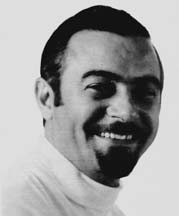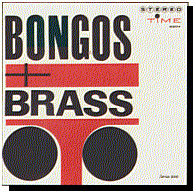Home · Listener's Guide · The Songs · Who's Who · Liner Notes · Selected Tracks · What's New · Search

Hugo Montenegro
- Born 2 September 1925, New York City, New York
- Died 6 February 1981, Palm Springs, California
 One of the great chameleons of space-age pop, Montenegro could be wild, innovative, swinging, sedate, tame, or mundane, depending on what the contract called for. After serving in the U.S. Navy, where he arranged for bands, he attended Manhattan College, studying composition. While in college. he began leading his own band for school dances, which led into professional gigs on a full-time basis. This was quickly interrupted, however, by a two-year stint in the U.S. Navy, most of which he spent as the arranger for the Newport Naval Base band in Rhode Island.
One of the great chameleons of space-age pop, Montenegro could be wild, innovative, swinging, sedate, tame, or mundane, depending on what the contract called for. After serving in the U.S. Navy, where he arranged for bands, he attended Manhattan College, studying composition. While in college. he began leading his own band for school dances, which led into professional gigs on a full-time basis. This was quickly interrupted, however, by a two-year stint in the U.S. Navy, most of which he spent as the arranger for the Newport Naval Base band in Rhode Island.
Andre Kostelanetz heard this band and met Montenegro during this time. When Montenegro left the Navy, Kostelanetz hired him as a staff manager and occasional arranger. He moved on to work for Harry Belafonte as the arranger and conductor for his live act.  While in New York City, Montenegro was hired by Time Records as a musical director, and produced a whole slew of albums for the label. Some, such as Bongos and Brass and Boogie Woogie and Bongos are frenzied examples of stereo/percussion showcase music. His arrangement of Grieg's In the Hall of the Mountain King is one of my favorite cuts.
While in New York City, Montenegro was hired by Time Records as a musical director, and produced a whole slew of albums for the label. Some, such as Bongos and Brass and Boogie Woogie and Bongos are frenzied examples of stereo/percussion showcase music. His arrangement of Grieg's In the Hall of the Mountain King is one of my favorite cuts.
Montenegro moved to Los Angeles in the early 1960s and began working in the studio system. Belafonte helped get him the job of scoring Otto Preminger's Hurry Sundown. He also worked for RCA, producing a series of albums that included both his soundtracks and covers of others'. His 1968 recording of Ennio Morricone's theme from the classical Sergio Leone spaghetti Western, The Good, the Bad, and the Ugly, featuring whistling by Muzzy Marcellino's, sold over a million copies and hit #2 on the Top Ten chart as a single. Montenegro's version also features an electric violin (played by Elliott Fisher), a piccolo trumpet (played by Manny Klein), an electronic harmonica, an ocarina, a vocal group, and Montenegro himself grunting nonsense Italian-sounding syllables.
Montenegro scored such classics of 60s Hollywood machismo as Dean Martin's two Matt Helm adventures, The Ambushers and The Wrecking Crew, Frank Sinatra's two films as the Miami private eye, Tony Rome and The Lady in Cement, and the Elvis Presley Western, Charro. He also ventured into some odd mixes of space-age pop, electronics, and rock with such albums as Moog Power, Mammy Blue, and The Dawn of Dylan. Montenegro contracted severe ephysema and was forced to retire from recording in the late 1970s.
Recordings
- Loves of My Life, 1957
- Hugo Montenegro, Ellington Fantasy, Vik LP
- Velvet Violins, Lush and Lovely, Movietone MTS 2008
- The Montenegro Brand, 20th Century Fox ST-91522
- Bongs and Brass, Time Series 2000 S/2014
- Cha Chas for Dancing, Time Series 2000 S/2018
- Boogie Woogie Bongos, Time Series 2000 S/2020
- Arriba!, Time Series 2000 S/2030
- Overture ... American Musical Theatre, Vol. 1: 1924-1935, Time S/2035
- Overture ... American Musical Theatre, Vol. 1: 1935-1945, Time S/2036
- Overture ... American Musical Theatre, Vol. 1: 1946-1952, Time S/2037
- Overture ... American Musical Theatre, Vol. 1: 1953-1960, Time S/2038
- Great Songs from Motion Pictures Vol. 1, Time S/2044
- Great Songs from Motion Pictures Vol. 2, Time S/2045
- Great Songs from Motion Pictures Vol. 3, Time S/2046
- In Italy, Time S/2051
- Hugo Montenegro and His Orchestra, Time S/2062
- Country and Western, Time S/2071
- Bold Brass Broadway, Time S/2139
- Black Velvet, Time S/2196
- Mira!, Mainstream S/6092)
- Montenegro Magic (2 LP set), Mainstream SOBO 91646
- In a Sentimental Mood, RCA Camden CAS-729
- Hurry Sundown, RCA Victor LOC 1133
- Russian Grandeur, RCA LPM-2902/LSP-2902
- The Young Beat of Rome, RCA Victor LSP-2958, 1964
- Candy's Theme and Other Sweets, RCA Victor LSP-3332, 1965
- The Man from U.N.C.L.E., RCA Victor LSP 3475
- Come Spy With Me, RCA Victor LSP 3540
- More from The Man from U.N.C.L.E., RCA Victor LSP 3574
- Others by Brothers, RCA Victor LSP 3784
- Music from "A Fistful of Dollars" and "The Good, The Bad and The Ugly," RCA Victor LSP-3927
- Hang 'Em High, RCA Victor, Stereo LSP-4022
- Moog Power, RCA Victor LSP-4170
- Good Vibrations, RCA Victor LSP-4104 (1969)
- Lady in Cement (soundtrack), 20th Century Fox S4204
- Colours of Love, RCA Victor LSP-4273
- Music from the Comedy Hit, "Viva Max!", RCA Victor LSP-3927
- The Best of Hugo Montenegro, RCA Victor LSP-4361
- Dawn of Dylan, 1970
- People ...One to One, RCA Victor LSP-4537 (1971)
- This is Hugo Montenegro, RCA Victor VPS-6036 (1971)
- Mammy Blue, RCA Victor LSP-4631 (1972)
- Love Theme From The Godfather, RCA APD1-0001
- Hugo in Wonderland, RCA Victor APD1-0413
- Neil's Diamonds, 1973
- Hugo in Wonder-land, 1974
- Rocket Man [Elton John covers], 1975

Hugo Montenegro.-->
S p a c e A g e P o p M u s i c
Home · Listener's Guide · The Songs · Who's Who · Liner Notes · Selected Tracks · What's New · Search
Email: editor@spaceagepop.com